高二英语第一学期期中考试试题1
高二上学期期中考试(英语)试题含答案
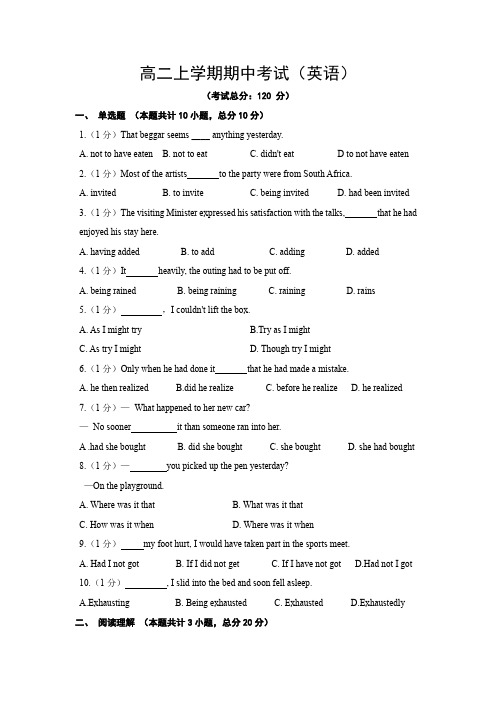
高二上学期期中考试(英语)(考试总分:120 分)一、单选题(本题共计10小题,总分10分)1.(1分)That beggar seems ____ anything yesterday.A. not to have eatenB. not to eatC. didn't eat D to not have eaten2.(1分)Most of the artists to the party were from South Africa.A. invitedB. to inviteC. being invitedD. had been invited3.(1分)The visiting Minister expressed his satisfaction with the talks, that he had enjoyed his stay here.A. having addedB. to addC. addingD. added4.(1分)It heavily, the outing had to be put off.A. being rainedB. being rainingC. rainingD. rains5.(1分),I couldn't lift the box.A. As I might tryB.Try as I mightC. As try I mightD. Though try I might6.(1分)Only when he had done it that he had made a mistake.A. he then realizedB.did he realizeC. before he realizeD. he realized7.(1分)—What happened to her new car?—No sooner it than someone ran into her.A .had she bought B. did she bought C. she bought D. she had bought8.(1分)—you picked up the pen yesterday?—On the playground.A. Where was it thatB. What was it thatC. How was it whenD. Where was it when9.(1分)my foot hurt, I would have taken part in the sports meet.A. Had I not gotB. If I did not getC. If I have not gotD.Had not I got10.(1分), I slid into the bed and soon fell asleep.A.ExhaustingB. Being exhaustedC. ExhaustedD.Exhaustedly二、阅读理解(本题共计3小题,总分20分)11.(6分)Welcome to your handy pricing guideThis leaflet gives you the prices for Royal Mails UK and International services and Parcelforce Worldwide UK services — whether your item is to the UK or abroad, urgent or you simply want a standard service. To obey national and international regulations governing the carriage of mail, and ensure that mail in transport does not present a danger to the general public, we restrict or ban certain items from our network.If you want to find out more about our parcel and letter services, please take a look at the ‘our services’ booklet for more detailed information. Alternatively, you can find out more by visiting or by calling Customer Services on 03457740740. If you are deaf or hearing impaired, we offer a Textphone service on 03456000606.(1)According to the leaflet, what kind of service can be offered?A.Sending items home and abroad.B.Getting some discount.C.Sending items without limits.D.Sending parcels only.(2)If your parcel is 45cm in length, 36cm in width, 20cm in depth and weighs 10kg, you need to pay ______.A.£23B.£43C.£68D.£90(3)Which of the following is specially intended for the deaf?A.The Textphone service on 03456000606.B.The Customer Services on 03457740740.C.The website .D.The ‘Our services’ booklet12.(8分)People have different ways of dealing with a common cold. Some take over-the- counter (非非非非) medicines such as aspirin while others try popular home remedies (非非) like herbal tea or chicken soup. Yet here is the tough truth about the common cold: nothing really cures it.So why do people sometimes believe that their remedies work? According to James Taylor, professor at the University of Washington, colds usually go away on their own in about a week, improving a little each day after symptoms peak, so it’s easy to believe it’s medicine rather than time that deserves the credit, USA Today reported.It still seems hard to believe that we can deal with more serious diseases yet are powerless against something so common as a cold. Recently, scientists came closer to figuring out why. To understand it, you first need to know how antiviral (非非非非) drugs work. They attack the virus by attaching to and changing the surface structures of the virus. To do that, the drug must fit and lock into the virus like the right piece of a jigsaw (非非), which means scientists have to identify the virus and build a 3-D model to study its surface before they can design an antiviral drug that is effective enough.The two cold viruses that scientists had long known about were rhinovirus (非非非) A and B. But they didn’t find out about the existence of a third virus, rhinovirus C, until 2006. All three of them contribute to the common cold, but drugs that work well against rhinovirus A and B have little effect when used against C.“This explains most of the previous failures of drug trials against rhinovirus,” study leader Professor Ann Palmenberg at University of Wisconsin-Madison, US, told Science Daily.Now, more than 10 years after the discovery of rhinovirus C, scientists have finally built a highly-detailed 3-D model of the virus, showing that the surface of the virus is, as expected, different from that of other cold viruses.With the model in hand, hopefully a real cure for a common cold is on its way. Soon, we may no longer have to waste our money on medicines that don’t really work.(1)What does the author think of popular remedies for a common cold?A.They are quite effective.B.They are slightly helpful.C.They still need to be improved.D.They actually have no effect.(2)How do antiviral drugs work?A.By breaking up cold viruses directly.B.By changing the surface structures of the cold viruses.C.By preventing colds from developing into serious diseases.D.By absorbing different kinds of cold viruses at the same time.(3)What can we infer from the passage?A.The surface of cold viruses looks quite similar.B.Scientists have already found a cure for the common cold.C.Scientists were not aware of the existence of rhinovirus C until recently.D.Knowing the structure of cold viruses is the key to developing an effective cure.(4)What is the best title for this passage?A.Drugs against cold virusesB.Helpful home remediesC.No current cure for common coldD.Research on cold viruses13.(6分)Wood has many great characteristics that make it the perfect building material.It is cheap,durable,easily available,and most importantly,environmentally sustainable.The one thing it is not,is transparent! Now thanks to a team of scientists at Stockholm’s KTH Royal Institute of Technology the material may even be able to add that feature to its already impressive list.Lead researcher rs Berglund said he was inspired to create the transparent wood after learning how Japanese researchers had developed a see-through paper for use in flexible display screens for electronic devices.The team began by pulling out the wood’s lignin(木质素).The lignin-free wood was then dipped into a polymer(聚合物)and baked at a temperature of 158°F for four hours.The result was a hybrid product that was not only stronger and lighter than the original wood but also,almost transparent.The researchers were able to adjust the level of transparency by varying the amount of the polymer injected and also by changing the thickness of the wood.While scientists have previously created a see-through wood for small-scale applications like computer chips,the transparent wood is the first one being considered for large scale applications.The researchers,who revealed their findings in Biomacromolecules on April 11,picture using the transparent wood in buildings to allow for more natural light,or to create windows that let in the desired amount of light withoutsacrificing privacy.Wood that allows light to pass through could lead to a brighter future for homes and buildings. Berglund also thinks the wood could play a significant role in the design of solar panels.The semitransparent material would be able to keep light longer and give it more time to interact with the conductor,thus resulting in better solar efficiency.Additionally,substituting the currently used glass with this new product would help solar energy manufacturers improve their carbon footprint and lower the cost.They are now experimenting with ways to scale up the manufacturing process so that the transparent material is cost-effective to make and easy to use.1.What does the underlined part“that feature”in Paragraph 1 refer to?A.Cheap.B.Durable.C.Sustainable.D.Transparent.2.Which of the following is true according to the text?A.Berglund got the idea of transparent wood while making paper.B.Varying the amount of the polymer changes the wood’s hardness.C.The transparent wood would be used only for homes and buildings.D.The cost of making the transparent wood still needs to be cut down.3.What is the last paragraph mainly about?A.The bright future of the transparent wood.B.The wood’s role in the design of solar panels.C.The disadvantages of the currently used glass.D.Solar energy manufacturers’ carbon footprint.三、阅读七选五(本题共计1小题,总分10分)14.(10分)When big news breaks,it's easy to get caught up in following the story online.The Internet can be a place to find useful information. 1 Helping kids understand the news and how to separate fact from fiction is an important job for parents and educators.Here’s some advice that parents can offer kids to help them be quicker to judge as they consume news online.2 In the rush to cover stories,reporters make mistakes,officials don't always have correct information and tidbits(八卦新闻)that sound reasonable often get passed around before anyone has checked them for accuracy.Use social media wisely.Some say Twitter is a great source of news in the first few minutes of a tragedy. 3 On the other hand,Facebook can be a great way to connect with friends affected by events in the news and to spread personal news within a more limited circle.Be skeptical. 4 After the Boston Marathon bombing,NBC Sports reported that some runners kept running all the way to the hospital to donate blood for the victims.Not true.There are plenty of websites devoted to exposing false news stories.The Washington Post also has a Fact Checker column that delivers claims made by public officials and politicians.Visit them to find out if a story is true.Keep it age-appropriate.Kids aren’t always ready to digest big tragic news--especially if the news is about kids,such as school shootings or abuses.The constant repetition of information can be confusing for younger kids,and at the beginning of a news event,parents might not be able to offer any correct answers. 5A.Remember,breaking news is often wrong.B.It also can be the source of misinformation.C.If something sounds too good to be true,it probably is.D.The government should take measures to prevent false news.E.However,after that it just becomes messy and largely inaccurate.F.With social media at your fingertips,it's convenient to express your opinion.G.Kids who are eager to learn more about certain events can check kid-guided news sources.四、完形填空(本题共计1小题,总分20分)15.(20分)In the summer before I entered middle school, I read the book They Cage the Animals at Night. It’s a story about Jennings, a boy living in various orphanages(孤儿院)with only his stuffed animal(毛绒玩具), Doggie, for companionship. It’s a fascinating book, but little did I know how it would__1___my life and the lives of others.One day, as I looked across my room at the pile of stuffed animals, a(n)___2____came to me. I would____3__stuffed animals for children like Jennings.____4____, I contacted agencies that support those children and they said the stuffed animals would certainly__5___children’s spirits.I named my project “Cuddle Buddies”. I wrote articles for the localand school newspapers,___6___donations of the“buddies”— stuffed animals. My phone___7__ringing; schools, families, and toy factories all wanted to help. Much to my___8__, by the second week my living room looked like a zoo. Whenever Mom and I___9__the “buddies” to the agencies, the kids would be waiting there with their eyes down, too___10__to look but shaking with excitement.Six years after its launch, Cuddle Buddies continues to__11__. Now over 25,000 stuffed animals have been__12__to agencies worldwide. Simon, a seven-year-old boy in an African Children’s Home, couldn’t sleep at night after he lost his parents. When asked to choose his “buddies”, Simon_ 13___ a panda and soon after was sleeping through the night. I never dreamed Cuddle Buddies would____14___this way.Upon graduating from high school, I designed a website,, to____15___the project. The response was____16____. More and more people joined me and two dozen Cuddle Buddies___17___were established across the nation.This has been a great experience. I’ve learned how to follow through on an idea and how to____18__impact a life.I will go to college with these___19___in mind and continue my work with Cuddle Buddies, even when I__20__ a whole new set of exciting academic and nonacademic pursuits.1.A.touch B.risk C.lead D.save2.A.chance B.idea C.explanation D.word3.A.display B.repair C.purchase D.collect4.A.Previously B.Occasionally C.Immediately D.Gradually5.A.capture B.reflect C.lift D.record6.A.putting aside B.turning down C.asking for D.getting back7.A.delayed B.kept C.stopped D.meant8.A.knowledge B.taste C.regret D.delight9.A.delivered B.applied C.rented D.returned10.A.shy B.content C.weak D.eager11.A.reform B.expand C.dominate D.divide12.A.produced B.adopted C.sold D.donated13.A.picked out B.came across C.showed off D.brought up14.A.decline B.work C.increase D.react15.A.promote B.start C.evaluate D.examine16.A.confusing B.amusing C.automatic D.enthusiasticpanies mittees C.branches D.institutes18.A.financially B.positively C.socially D.physically19.A.plans B.images C.lessons D.motives20.A.work out B.keep off C.rely on D.engage in五、语法填空(本题共计1小题,总分15分)16.(15分)阅读下面短文,在空白处填入1个适当的单词或括号内单词的正确形式。
重庆市2024-2025学年高二上学期期中考试英语试题(无答案)
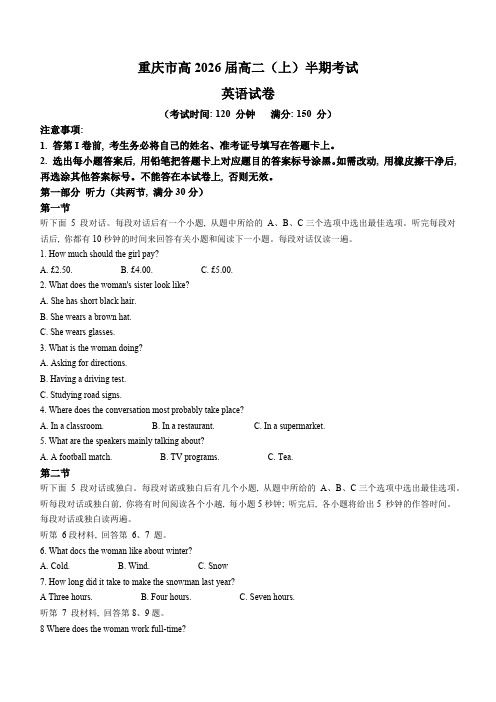
重庆市高2026届高二(上)半期考试英语试卷(考试时间: 120 分钟满分: 150 分)注意事项:1. 答第I卷前, 考生务必将自己的姓名、准考证号填写在答题卡上。
2. 选出每小题答案后, 用铅笔把答题卡上对应题目的答案标号涂黑。
如需改动, 用橡皮擦干净后, 再选涂其他答案标号。
不能答在本试卷上, 否则无效。
第一部分听力(共两节, 满分30分)第一节听下面 5 段对话。
每段对话后有一个小题, 从题中所给的A、B、C三个选项中选出最佳选项。
听完每段对话后, 你都有10秒钟的时间来回答有关小题和阅读下一小题。
每段对话仅读一遍。
1. How much should the girl pay?A. £2.50.B. £4.00.C. £5.00.2. What does the woman's sister look like?A. She has short black hair.B. She wears a brown hat.C. She wears glasses.3. What is the woman doing?A. Asking for directions.B. Having a driving test.C. Studying road signs.4. Where does the conversation most probably take place?A. In a classroom.B. In a restaurant.C. In a supermarket.5. What are the speakers mainly talking about?A. A football match.B. TV programs.C. Tea.第二节听下面 5 段对话或独白。
每段对诺或独白后有几个小题, 从题中所给的A、B、C三个选项中选出最佳选项。
高中二年级英语第一学期期中考试卷1
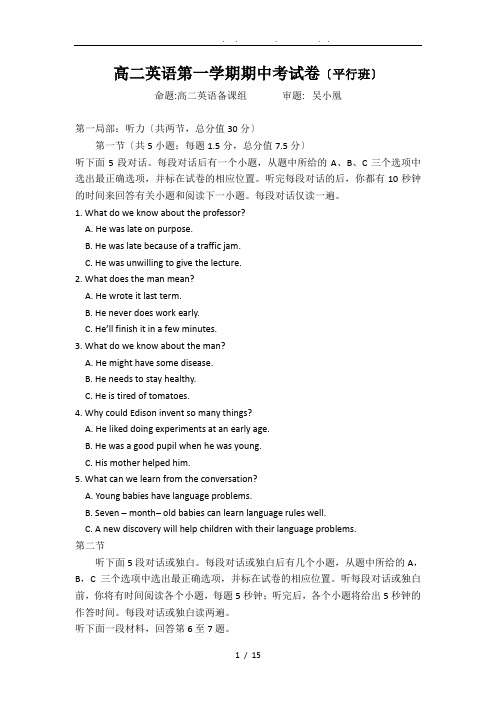
高二英语第一学期期中考试卷〔平行班〕命题:高二英语备课组审题: 吴小凰第一局部:听力〔共两节,总分值30分〕第一节〔共5小题;每题1.5分,总分值7.5分〕听下面5段对话。
每段对话后有一个小题,从题中所给的A、B、C三个选项中选出最正确选项,并标在试卷的相应位置。
听完每段对话的后,你都有10秒钟的时间来回答有关小题和阅读下一小题。
每段对话仅读一遍。
1. What do we know about the professor?A. He was late on purpose.B. He was late because of a traffic jam.C. He was unwilling to give the lecture.2. What does the man mean?A. He wrote it last term.B. He never does work early.C. He’ll finish it in a few minutes.3. What do we know about the man?A. He might have some disease.B. He needs to stay healthy.C. He is tired of tomatoes.4. Why could Edison invent so many things?A. He liked doing experiments at an early age.B. He was a good pupil when he was young.C. His mother helped him.5. What can we learn from the conversation?A. Young babies have language problems.B. Seven – month– old babies can learn language rules well.C. A new discovery will help children with their language problems.第二节听下面5段对话或独白。
(整理版高中英语)第一学期期中考试高二英语试题

- 第一学期期中考试高二英语试题本试卷分第一卷(选择题)和第二卷(非选择题)两局部。
考生作答时,将1-50小题答案答在答题卡上,在本试卷上答题无效。
总分值120分。
考试时间为100分钟。
听力考试〔30分〕另外安排时间进行。
第一卷第一局部:听力〔共两节,总分值30分〕第二局部:英语知识运用〔共两节,总分值45分〕第一节:语法和词汇知识〔共15 小题;每题1分,总分值15分〕从A、B、C、D四个选项中,选出可以填入空白处的最正确选项,并在答题卡上将该项涂黑。
1. ---What do you want to do next? We have half an hour until the basketball game. ---____. Whatever you want to do is fine with me.A. It just dependsB. It’s up to youC. All rightD. Glad to hear that2. I can never make ________ a word he says.A. a senseB. the sense ofC. a sense ofD. sense of3. The teacher couldn’t make himself ___ attention to because the students were so noisy.A. to payB. to be paidC. paidD. pay4. My cousin doesn't know what to ______ at the university; he can't make up his mind about his future.A. take onB. take awayC. take upD. take after5. Out ______ , angrily with a stick in his hand.A. did he rushB. he rushedC. rushed heD. he did rush6. Most of the artists ______ to the party were from China.A. invitedB. to inviteC. being invitedD. to be invited7. England is the largest of the four countries and _______it is divided roughly into three zones.A in convenienceB with convenienceC for convenienceD at convenience8. Before graduation, we had a lot of practical _____ by doing a part-time job in the company and it was really _____ for us.A. experience; a great experienceB. experiences; a great experienceC. experience; great experienceD. experience; great experiences9. This book is said to be a special one which ________ many events not found in other history books.A. writesB. coversC. printsD. reads10. My chest _____ when I take a deep breath, doctor.A. hurtsB. woundsC. harmsD. injures11. He is very good at carpentering, though _______.A. he was very youngB. very youngC. he very youngD. is very young12. The fellow felt rather ________ as he was the only person that wore sportswear at the party.A. in placeB. out of placeC. by the wayD. in the way13. Next door to ours _______, who has just returned form abroad.A. where lives an old manB. where does an old man liveC. lives an old manD. does an old man live14. _______ to sunlight for too much time will do harm to one's skin.A. ExposedB. Having exposedC. Being exposedD. After being exposed15. _______money, the boy had to give up school to support his poor family.A. LackedB. Lacking ofC. LackingD. Lacked of第二节:完形填空(共20小题;每题1分,总分值30分)阅读以下短文,掌握其大意,然后从16-35各题所给的四个选项中,选出最正确选项。
高二上学期英语期中考试专项复习卷1:单项选择+
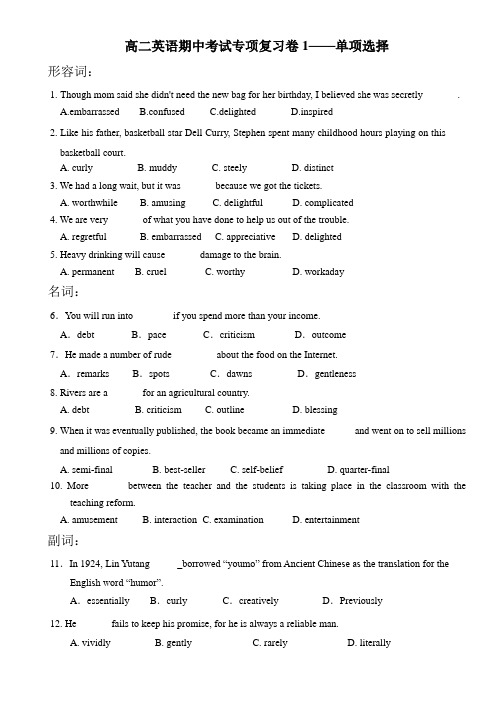
高二英语期中考试专项复习卷1——单项选择形容词:1.Though mom said she didn't need the new bag for her birthday, I believed she was secretly_______.A.embarrassedB.confusedC.delightedD.inspired2. Like his father, basketball star Dell Curry, Stephen spent many childhood hours playing on this____basketball court.A. curlyB. muddyC. steelyD. distinct3. We had a long wait, but it was ______ because we got the tickets.A. worthwhileB. amusingC. delightfulD. complicated4. We are very ______ of what you have done to help us out of the trouble.A. regretfulB. embarrassedC. appreciativeD. delighted5. Heavy drinking will cause ______ damage to the brain.A. permanentB. cruelC. worthyD. workaday名词:6.You will run into________if you spend more than your income.A.debt B.pace C.criticism D.outcome7.He made a number of rude ________ about the food on the Internet.A.remarks B.spots C.dawns D.gentlenessA. debtB. criticismC. outlineD. blessing9. When it was eventually published, the book became an immediate _____ and went on to sell millionsand millions of copies.A. semi-finalB. best-sellerC. self-beliefD. quarter-final10. More ______ between the teacher and the students is taking place in the classroom with theteaching reform.A. amusementB. interactionC. examinationD. entertainment副词:11.In 1924, Lin Yutang ______borrowed “youmo” from Ancient Chinese as the translation for the English word “humor”.A.essentially B.curly C.creatively D.Previously12. He ______ fails to keep his promise, for he is always a reliable man.A. vividlyB. gentlyC. rarelyD. literally动词:13.Although I dreamed about traveling abroad, now I’m determined to ____ the beauty of our motherland.A. appreciateB. blameC. distractD. suspect14.I would like to ______ with a few points at end of the meetingA.concludeB. composeC. conductD. concern15. My father ______ on me the value of hard work, teaching me to be an honest worker.A. leftB. entertainedC. whisperedD. impressed16. The soldier ______ the award for his acts of bravery in the war.A.illuminatesB. concludesC. deservesD. examines17. Wealth does not ______ happiness.A. concludeB. impressC. deserveD. guarantee短语:18.—Chris refused to have a picnic with us this Sunday and said it wasn’t interesting.—It is typical of him to do so. He is________.A.an eager beaver B.a wet blanket C.a dark horse D.a lucky dog19.They decided to forgive and forget, and ________to try to rebuild the relationship.A. be cool as a cucumber B.drag their feetC.turn over a new leaf D.not lift a fingerA. go aboutB. descend uponC. probe intoD. come across21. How COVID-19 spreads in the recent outbreak is something ______.A. worthy of noteB. cruel in characterC. worthy of whileD. essential in decision22. Commercial insurance helps to ease the skyrocketing costs of ______.A. health careB. amusement parkC. laughing stockD. brand of humour23. If you want to lose weight, walking to your office every day will ______.A. crack a smileB. do the trickC. make an apologyD. leave an impression24. The recent discoveries from the ancient tomb ______ the hidden history of the family.A. throws light onB. works closely withC. plays a trick onD. leave an impression on25. Generally speaking, interviewers ask these questions to see how well you perform under pressureand ______.A. roar with laughterB. do a great jobC. think on your feetD. make a long face26. I like the scene in the movie where one of the students asks a tricky question, trying to ______.A. be a laughing stockB. pay more attentionC. focus on the teacherD. put the teacher on the spot27. Hofman’ s inspiration for Floating Fish came from Chinese__ passed down through the generations.A. laughing stocksB. practical jokesC. health careD. folk tales语法:非限制性定语从句:28.On the eve of the Spring Festival, I usually stay up until midnight, ________I can set off the firecrackers and fireworks.A.which B.when C.where D.who29. She got the first prize for her composition in the contest, _____amazed her parents greatly.A.which B.that C.who D.it30. My desk mate is always playing practical jokes, ______ I find annoying.A. thatB. whichC. whoD. whom31. John invited about 40 people to his wedding ceremony, most of ______ were family members.A. whereB. themC. whichD. whom32. Following the girl, we went into a hall, on ______ walls hung pictures of some famous scientists.A. whoseB. itsC. whichD. that33. The Tang Dynasty is generally regarded as a golden chapter by people worldwide, ____ the Chinesecivilization influenced many neighbouring countries.A. whereB. whenC. whichD. whose34.Endurance, perseverance, industry and talent are the means _________ men achieve great ends.A.in which B.by which C.of which D.on which35.The novel published last month,________ author was a 15-year-old girl, is a best-seller.A. whichB. whoC. whenD. whose动词不定式与动词-ing作宾语:36.We regret ________ you that the book you need is not available at the moment in this library.A.having told B.telling C.to tell D.to have told37.His laziness and carelessness led to________in the examination.A.fail B.having failed C.failed D.failing38. Would you mind ______ the door behind you? It’s cold here.A. to closeB. having closedC. to have closedD. closing39. Today, Liu Wei still enjoys _____ music, and his positive attitude is an inspiration to us all.A. playingB. to playC. having playedD. to have played40. Despite this, he wanted________ life to the full.A. livingB. to liveC. livedD. lives动词-ing作主语:41._______ to bed early and getting up early is considered to be a good habit.A.GoingB.To goC.having goneD. gone42. As the saying goes—There is no sense________ over the spilt milk.A. to cryB. cryC.criedD.crying43._____music is like writing an article; you need to make something new that’s completely your own. A.To compose B.Composing C.Composed D.Compose44. ______along the old Silk Road is an interesting and rewarding experience.A.Travel B.Travelling C.Being travelled D.Travelled45.It is no good ________ without understanding.A.read B.to read C.reading D.being reading非谓语作表语:46.He was particularly _______ in the old story about a fish jumping through the “Dragon Gate”.A.to interestB. interestingC. interestedD. have interested47. The news is really _________.A. excitingB.excitedC. excitementD. excite48. When I was 13, my only purpose was________ the star on our football team.A.to become B.becoming C.to have become D.becomes49.Ladies and gentlemen, please remain __________ until the plane has come to a complete stop.A.seated B.seating C.to seat D.seat50. Our job is ______English well and spreading Chinese culture to the world.A. to learnB. learnedC. learningD. learn。
天津市第一中学2024_2025学年高二英语上学期期中试题

天津市第一中学2024-2025学年高二英语上学期期中试题本试卷分为第I 卷(选择题)、第 II 卷(非选择题)两部分,共 100 分,考试用时90 分钟。
第I 卷 1 至 5 页,第 II 卷 6 页。
考生务必将答案涂写规定的位置上,答在试卷上的无效。
祝各位考生考试顺当!I 卷 (满分 70 分)I.听力理解(共 20 小题,每小题 0.5 分,满分 10 分)第一节听下面 5 段对话。
每段对话后有一个小题,从题中所给的 A,B,C 三个选项中选出最佳选项,并标在试卷的相应位置。
每段对话仅读一遍。
1.What will the man go to London to do?A. Attend a meeting.B. Go sightseeing.C. Visit someone.2.What’s wrong with the man’s alarm clock?A. It doesn’t work well.B. It tells wrong time.C. It rings all the time.3.What’s the man’s nationality?A. Canadian.B. British.C. American.4.What’s the weather going to be like tomorrow?A. Cloudy.B. Rainy.C. Sunny.5.What is the man going to do first after school today?A. Play basketball.B. Study at the library.C. Go home.其次节听下面 5 段对话或独白。
每段对话或独白后有几个小题,从题中所给的 A,B,C 三个选项中选出最佳选项,并标在试卷的相应位置。
每段对话或独白读两遍。
听第 6 段材料,回答第 6~7 题。
6.What can we know about Peter?A.He has just got married.B.He met his girlfriend unexpectedly.C.He has returned home from abroad.7.What will the man go to Pairs for?A. Business.B. Sightseeing.C. Honeymoon. 听第 7 段材料,回答第 8~10 题。
高二英语上学期期中考试卷(附答案)
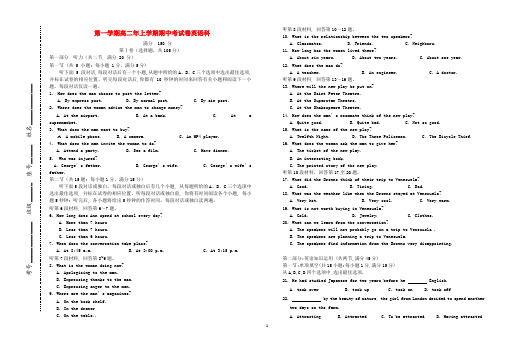
1考号_____________ 班级______ 座号______ 姓名_____________第一学期高二年上学期期中考试卷英语科满分 150 分 第Ⅰ卷(选择题,共105分)第一部分 听力(共二节, 满分 20 分)第一节 (共 5 小题; 每小题 1分,满分5分)听下面 5 段对话,每段对话后有一个小题,从题中所给的A 、B 、C 三个选项中选出最佳选项,并标在试卷的相应位置。
听完每段对话后,你都有 10 秒钟的时间来回答有关小题和阅读下一小题。
每段对话仅读一遍。
1. How does the man choose to post the letter?A. By express post.B. By normal post.C. By air post. 2. Where does the woman advise the man to change money?A. At the airport.B. At a bank.C. At a supermarket.3. What does the man want to buy?A. A mobile phone. B . A camera. C. An MP4 player. 4. What does the man invite the woman to do?A. Attend a party.B. See a film.C. Have dinner. 5. Who was injured?A. George ’s father.B. George ’s wife.C. George ’s wife ’s father.第二节(共15题; 每小题1分,满分15分)听下面5段对话或独白。
每段对话或独白后有几个小题, 从每题所给的A 、B 、C 三个选项中选出最佳选项, 并标在试卷的相应位置。
听每段对话或独白前, 你将有时间阅读各个小题, 每小题5秒钟; 听完后, 各小题将给出5秒钟的作答时间。
第一学期期中考试高二英语试卷

第一学期期中考试高二英语试卷第Ⅰ卷第一部分:听力(共两节,满分30分)第一节(共5小题;每小题1.5分,满分7.5分)1、What time does the office open?A、8:15.B、7:45.C、8:00.2、What is the woman going to do?A、She is going to help the man with his maths.B、She is going to be the man’s teacher.C、She is going to talk to the man.3、What is the man?A、A teacher.B、A doctor.C、A student.4、Where does the woman have to get off?A、At the Bank of China.B、At the post office.C、At the next stop.5、What can we learn from the conversation?A、The woman likes physics better.B、The man likes physics better.C、Both the man and the woman like physics better.第二节(共15小题;每小题1.5分,满分22.5分)听第6段材料,回答第6、7题。
6、What is the woman going to do?A、Buy a birthday gift for David.B、Buy a pet for her husband.C、Buy some animals for the zoo.7、What can we learn from the conversation?A、The man likes keeping rabbits.B、The man built a zoo.C、The man doesn’t like snakes.听第7段材料,回答第8至10题。
湖南省长沙市2024-2025学年高二上学期期中考试英语试卷含答案

长沙市2024—2025学年度高二第一学期期中考试英语(答案在最后)时量:120分钟满分:150分得分:________第一部分听力(共两节,满分30分)做题时,先将答案标在试卷上。
录音内容结束后,你将有两分钟的时间将试卷上的答案转涂到答题卡上。
第一节(共5小题;每小题1.5分,满分7.5分)听下面5段对话。
每段对话后有一个小题,从题中所给的A、B、C三个选项中选出最佳选项。
听完每段对话后,你都有10秒钟的时间来回答有关小题和阅读下一小题。
每段对话仅读一遍。
例:How much is the shirt?A.£19.15.B.£9.18.C.£9.15.答案是C。
1.What will the woman take with her?A.A sports bag.B.A suitcase.C.A backpack.2.Why did the man call off his trip?A.The weather was bad.B.He wasn’t interested in it.C.There was an urgent situation.3.What will the woman do?A.Collect some plants.B.Go to work in the lab.C.Deliver some materials.4.How does the man feel about his grandmother’s moving in?A.Appreciative.B.Surprised.C.Anxious.5.Where is the woman’s book now?A.On a bed.B.On a desk.C.In a chest.第二节(共15小题;每小题1.5分,满分22.5分)听下面5段对话或独白。
每段对话或独白后有几个小题,从题中所给的A、B、C三ˊ选项中选出最佳选项。
北京市2024-2025学年高二上学期期中英语试题含答案
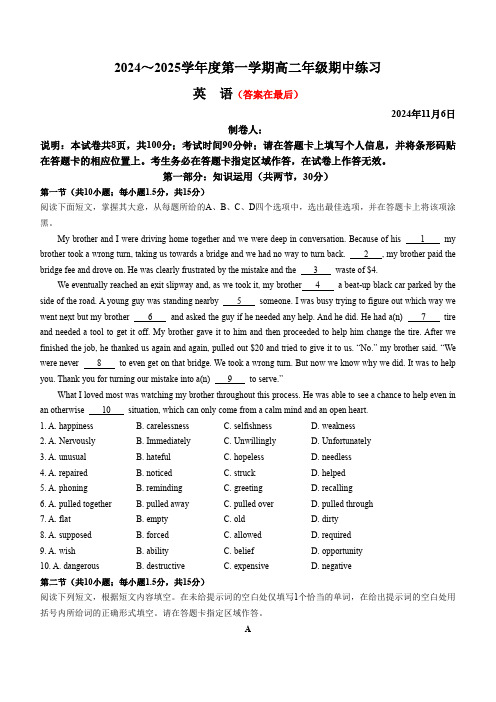
2024~2025学年度第一学期高二年级期中练习英语(答案在最后)2024年11月6日制卷人:说明:本试卷共8页,共100分;考试时间90分钟;请在答题卡上填写个人信息,并将条形码贴在答题卡的相应位置上。
考生务必在答题卡指定区域作答,在试卷上作答无效。
第一部分:知识运用(共两节,30分)第一节(共10小题;每小题1.5分,共15分)阅读下面短文,掌握其大意,从每题所给的A、B、C、D四个选项中,选出最佳选项,并在答题卡上将该项涂黑。
My brother and I were driving home together and we were deep in conversation.Because of his1my brother took a wrong turn,taking us towards a bridge and we had no way to turn back.2,my brother paid the bridge fee and drove on.He was clearly frustrated by the mistake and the3waste of$4.We eventually reached an exit slipway and,as we took it,my brother4a beat-up black car parked by the side of the road.A young guy was standing nearby5someone.I was busy trying to figure out which way we went next but my brother6and asked the guy if he needed any help.And he did.He had a(n)7tire and needed a tool to get it off.My brother gave it to him and then proceeded to help him change the tire.After we finished the job,he thanked us again and again,pulled out$20and tried to give it to us.“No.”my brother said.“We were never8to even get on that bridge.We took a wrong turn.But now we know why we did.It was to help you.Thank you for turning our mistake into a(n)9to serve.”What I loved most was watching my brother throughout this process.He was able to see a chance to help even in an otherwise10situation,which can only come from a calm mind and an open heart.1.A.happiness B.carelessness C.selfishness D.weakness2.A.Nervously B.Immediately C.Unwillingly D.Unfortunately3.A.unusual B.hateful C.hopeless D.needless4.A.repaired B.noticed C.struck D.helped5.A.phoning B.reminding C.greeting D.recalling6.A.pulled together B.pulled away C.pulled over D.pulled through7.A.flat B.empty C.old D.dirty8.A.supposed B.forced C.allowed D.required9.A.wish B.ability C.belief D.opportunity10.A.dangerous B.destructive C.expensive D.negative第二节(共10小题;每小题1.5分,共15分)阅读下列短文,根据短文内容填空。
高二第一学期英语期中考试试卷及答案
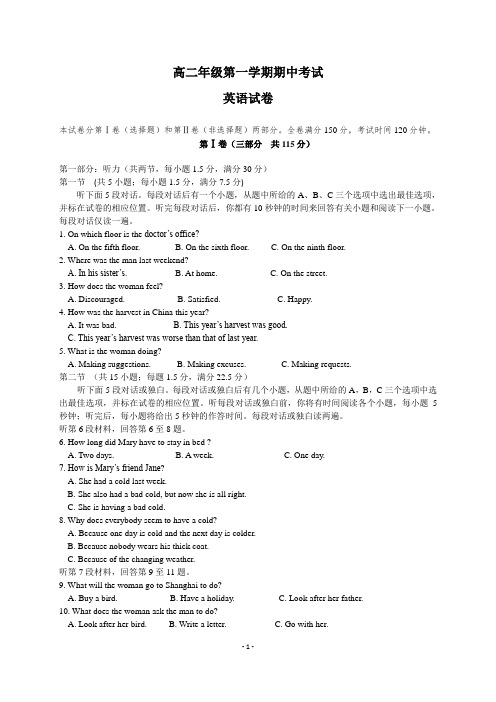
高二年级第一学期期中考试英语试卷本试卷分第Ⅰ卷(选择题)和第Ⅱ卷(非选择题)两部分。
全卷满分150分,考试时间120分钟。
第Ⅰ卷(三部分共115分)第一部分:听力(共两节,每小题1.5分,满分30分)第一节(共5小题;每小题1.5分,满分7.5分)听下面5段对话。
每段对话后有一个小题,从题中所给的A、B、C三个选项中选出最佳选项,并标在试卷的相应位置。
听完每段对话后,你都有10秒钟的时间来回答有关小题和阅读下一小题。
每段对话仅读一遍。
1. On which floor is the doctor’s office?A. On the fifth floor.B. On the sixth floor.C. On the ninth floor.2. Where was the man last weekend?A. In his sister’s.B. At home.C. On the street.3. How does the woman feel?A. Discouraged.B. Satisfied.C. Happy.4. How was the harvest in China this year?A. It was bad.B. This year’s harvest was good.C. This year’s harvest was worse than that of last year.5. What is the woman doing?A. Making suggestions.B. Making excuses.C. Making requests.第二节(共15小题;每题1.5分,满分22.5分)听下面5段对话或独白。
每段对话或独白后有几个小题,从题中所给的A,B,C三个选项中选出最佳选项,并标在试卷的相应位置。
听每段对话或独白前,你将有时间阅读各个小题,每小题5秒钟;听完后,每小题将给出5秒钟的作答时间。
高二第一学期期中考试(英语)试卷含答案
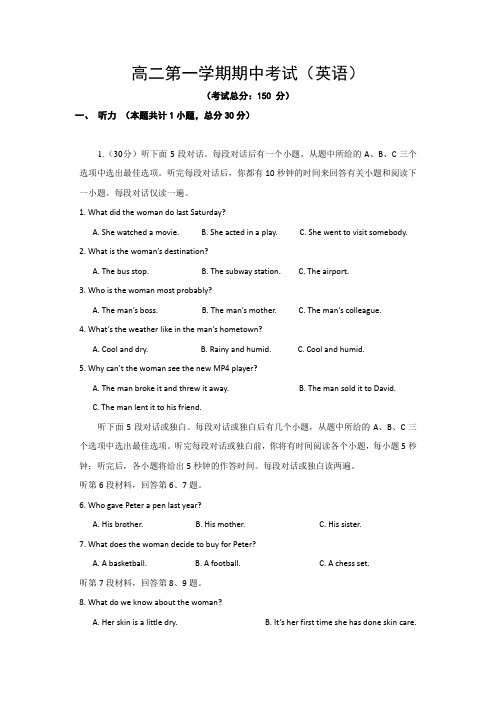
高二第一学期期中考试(英语)(考试总分:150 分)一、听力(本题共计1小题,总分30分)1.(30分)听下面5段对话。
每段对话后有一个小题,从题中所给的A、B、C三个选项中选出最佳选项。
听完每段对话后,你都有10秒钟的时间来回答有关小题和阅读下一小题。
每段对话仅读一遍。
1. What did the woman do last Saturday?A. She watched a movie.B. She acted in a play.C. She went to visit somebody.2. What is the woman’s destination?A. The bus stop.B. The subway station.C. The airport.3. Who is the woman most probably?A. The man’s boss.B. The man’s mother.C. The man’s colleague.4. What’s the weather like in the man’s hometown?A. Cool and dry.B. Rainy and humid.C. Cool and humid.5. Why can’t the woman see the new MP4 player?A. The man broke it and threw it away.B. The man sold it to David.C. The man lent it to his friend.听下面5段对话或独白。
每段对话或独白后有几个小题,从题中所给的A、B、C三个选项中选出最佳选项。
听完每段对话或独白前,你将有时间阅读各个小题,每小题5秒钟;听完后,各小题将给出5秒钟的作答时间。
每段对话或独白读两遍。
听第6段材料,回答第6、7题。
6. Who gave Peter a pen last year?A. His brother.B. His mother.C. His sister.7. What does the woman decide to buy for Peter?A. A basketball.B. A football.C. A chess set.听第7段材料,回答第8、9题。
天津市2023-2024学年高二上学期期中考试英语试题含解析
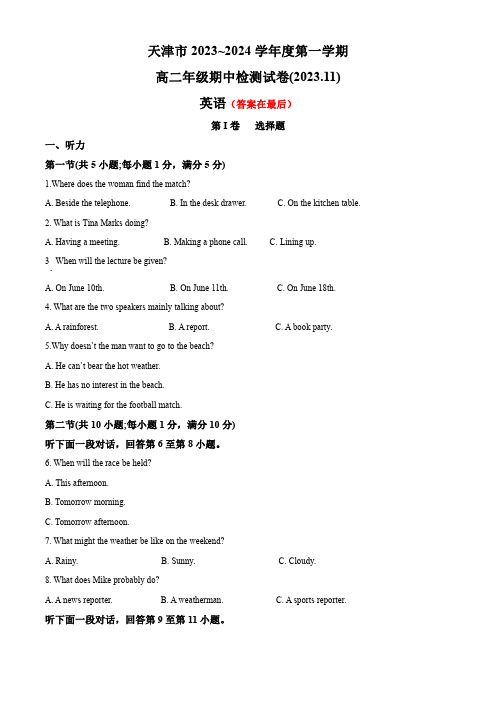
天津市2023~2024学年度第一学期高二年级期中检测试卷(2023.11)英语(答案在最后)第I卷选择题一、听力第一节(共5小题;每小题1分,满分5分)1.Where does the woman find the match?A.Beside the telephone.B.In the desk drawer.C.On the kitchen table.2.What is Tina Marks doing?A.Having a meeting.B.Making a phone call.C.Lining up.3.When will the lecture be given?A.On June10th.B.On June11th.C.On June18th.4.What are the two speakers mainly talking about?A.A rainforest.B.A report.C.A book party.5.Why doesn’t the man want to go to the beach?A.He can’t bear the hot weather.B.He has no interest in the beach.C.He is waiting for the football match.第二节(共10小题;每小题1分,满分10分)听下面一段对话,回答第6至第8小题。
6.When will the race be held?A.This afternoon.B.Tomorrow morning.C.Tomorrow afternoon.7.What might the weather be like on the weekend?A.Rainy.B.Sunny.C.Cloudy.8.What does Mike probably do?A.A news reporter.B.A weatherman.C.A sports reporter.听下面一段对话,回答第9至第11小题。
高二英语第一学期期中考试试题_附答案
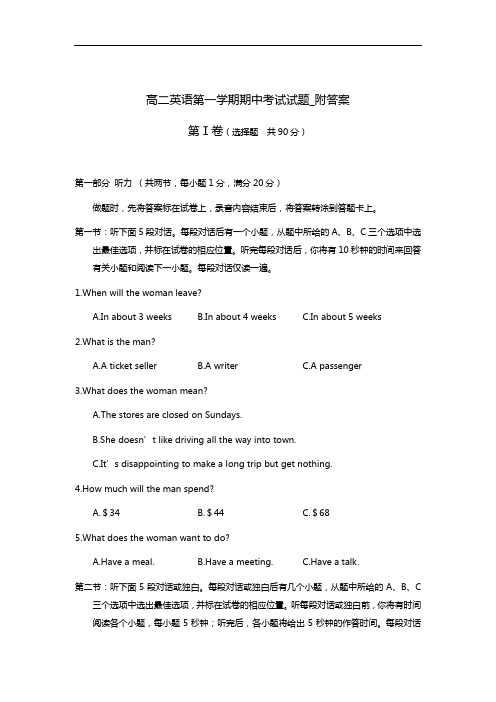
高二英语第一学期期中考试试题_附答案第Ⅰ卷(选择题共90分)第一部分听力(共两节,每小题1分,满分20分)做题时,先将答案标在试卷上,录音内容结束后,将答案转涂到答题卡上。
第一节:听下面5段对话。
每段对话后有一个小题,从题中所给的A、B、C三个选项中选出最佳选项,并标在试卷的相应位置。
听完每段对话后,你将有10秒钟的时间来回答有关小题和阅读下一小题。
每段对话仅读一遍。
1.When will the woman leave?A.In about 3 weeksB.In about 4 weeksC.In about 5 weeks2.What is the man?A.A ticket sellerB.A writerC.A passenger3.What does the woman mean?A.The stores are closed on Sundays.B.She doesn’t like driving all the way into town.C.It’s disappointing to make a long trip but get nothing.4.How much will the man spend?A.$34B.$44C.$685.What does the woman want to do?A.Have a meal.B.Have a meeting.C.Have a talk.第二节:听下面5段对话或独白。
每段对话或独白后有几个小题,从题中所给的A、B、C 三个选项中选出最佳选项,并标在试卷的相应位置。
听每段对话或独白前,你将有时间阅读各个小题,每小题5秒钟;听完后,各小题将给出5秒钟的作答时间。
每段对话或独白读两遍。
听第6段材料,回答第6-8题。
6.When does the conversation take place?A.In the morning.B.In the afternoon.C.At noon.7.How many people will come with Mrs Bellington for dinner?A.3B.4C.58.Where will they sit?A.In the center of the restaurant.B.Near the kitchen.C.By the window.听第7段材料,回答第9-11题。
高二英语上学期期中试题 附答案
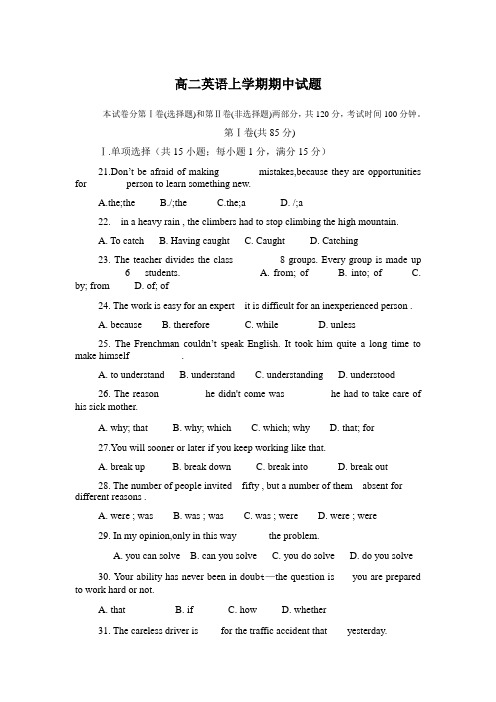
高二英语上学期期中试题本试卷分第Ⅰ卷(选择题)和第Ⅱ卷(非选择题)两部分,共120分,考试时间100分钟。
第Ⅰ卷(共85分)Ⅰ.单项选择(共15小题;每小题1分,满分15分)21.Don’t be afraid of making________mistakes,because they are opportunities for________person to learn something new.A.the;theB./;theC.the;aD. /;a22. in a heavy rain , the climbers had to stop climbing the high mountain.A. To catchB. Having caughtC. CaughtD. Catching23. The teacher divides the class ________ 8 groups. Every group is made up ________ 6 students. A. from; of B. into; of C. by; from D. of; of24. The work is easy for an expert it is difficult for an inexperienced person .A. becauseB. thereforeC. whileD. unless25. The Frenchman couldn’t speak English. It took him quite a long time to make himself __________.A. to understandB. understandC. understandingD. understood26. The reason ________ he didn't come was ________ he had to take care of his sick mother.A. why; thatB. why; whichC. which; whyD. that; for27.You will sooner or later if you keep working like that.A. break upB. break downC. break intoD. break out28. The number of people invited fifty , but a number of them absent for different reasons .A. were ; wasB. was ; wasC. was ; wereD. were ; were29. In my opinion,only in this way______ the problem.A. you can solveB. can you solveC. you do solveD. do you solve30. Your ability has never been in doub t—the question is ___you are prepared to work hard or not.A. thatB. ifC. howD. whether31. The careless driver is ____for the traffic accident that____yesterday.A.to blame;happenedB.to blame; was happenedC. to be blamed;was happenedD. to be blamed;happened32. With the advanced technology, our factory produces __________ cars as we did last year.A. as twice manyB. as many as twiceC. twice as manyD. as twice as many33. The man kept silent in the room unless __________.A.spokenB. speakingC.to speakD. spoken to34. —Do you often visit your grandparents?—Mm m...____,I’m afraid. I usually phone them.A.over and over againB. time and againC. once againD. now and then35.—Do you mind if I smoke in this room ?—.A. I’d rather you didn’t,actuallyB. Of course not. It’s not allowed here .C. Great ! I dislike smoking .D. No , you can’tⅡ.完形填空(共20小题;每小题1.5分,满分30分)In the sickroom, a dying girl had lain in bed for almost two months. Beside her was her mother who looked 36 .“Mum, I want to take a look at the 37 outside the window!” said the young girl 38 a low voice.With the help of her 39 , she came up to the window and looked out of it, 40 for her lost youth. The wind was blowing 41 . She noticed some 42 falling off a big tree outside the window.“I am 43 ! As soon as the leaves of the big tree all fall down. I will leave the world!” said the young girl. Watching the falling leaves, the young girl couldn’t 44 bursting into tears.From then on, the young girl’s illness got worse and worse and she lost more and more color. In November, the girl’s illness took a turn for the worse and she 45 treatment.The girl’s mother was so worried that she asked her friend, who was a(n) 46 , for help. The artist had 47 on the young girl who was dying and he felt that he must do something to 48 the girl. In order to save the young girl’s 49 , the artist decided to draw many leaves and hang them on the tree branches 50 .The young girl was 51 to see that the tree came into 52 again the next day. She began to feel pretty 53 about her future and began to receive treatment. She made a quick 54 from her illness. Several months later, she was out of 55 .36. A. happy B. comfortable C. pale D. pressed37. A. houses B. passers-by C. cars D. scenery38. A. with B. in C. at D. by39. A. father B. friend C. nurse D. mother40. A. sighing B. enjoying C. paining D. hurrying41. A. gently B. hard C. softly D. lightly42. A. leaves B. branches C. fruits D. birds43. A. awaking B. dying C. living D. killing44. A. stop B. keep C. help D. choose45. A. refused B. accepted C. hoped D. longed for46. A. doctor B. teacher C. artist D. psychologist47. A. relation B. terms C. emotion D. pity48. A. help B. kill C. push D. love49. A. sickness B. sight C. requirement D. life50.A.on purpose B. by force C. with notice D. by stealth51. A. surprised B. disappointed C. pleased D. angry52. A. life B. leaf C. dream D. cure53. A. curious B. anxious C. acceptable D. hopeful54. A. recovery B. struggle C. treat D. agreement55. A. sickroom B. window C. hospital D. clinicⅢ.阅读理解(共两节,满分40分)第一节(共15小题;每小题2分,满分30分)ACanada is a very large country.It is the second largest country in the world.By contrast it has a very small population.There are only about 29 million people there.Most Canadians are of British or French origin(血统),and French is an official language of Canada as well as English.About 45% of the people are of British origin,that is,they or their parents or grandparents,etc,come from British.Nearly 30%are of French origin.Most of the French–Canadians live in province of Quebec.Over the years,people have come to live in Canada from many countries in the world.They are from many countries in the world.They are from most European countries and also from China,besides other Asian c ountries.However,Canada was not an empty c ountry when the Europeans began to arrive.Canadian Indians lived along the coast,by the rivers and lakes and in forests.Today,there are only about 350,000 Indians in the whole country,with their own languages.In the far north live the Inuit,there are only 27,000 Canadian-Inuit.Their life is hard in such a difficult climate.56.According to the passage, about ____ live in Quebec.A.350,000 IndiansB.45% of the CanadiansC.29,000,000 people D.8,700,000 French – Canadians57.The official languages of Canada are ____.A.English and Chinese B.French and EnglishC.Indian and French D.Chinese and Inuit58.Which of the following is true according to this passage?A.There are 27,000 Canadian-Indians in Canada.B.More than 13 million people have come from Britain and France recent years.C.There are 30% of the population whose parents or grandparents come from France.D.There are no people when the Europeans began to arrive in Canada.BA man named Smith was sitting on his roof during a flood, and the water was up to his feet. Before long a fellow in a canoe passed and shouted, "Can I give you a lift to higher ground?""No, thanks," said Smith. "I have faith in God and he will save me."Soon the water rose to Smith's waist. At this point a motor boat pulled up and someone called out, "Can I give you a lift to higher ground?""No, thanks, I have faith in God and he will save me."Later a helicopter flew by, and Smith was now standing on the roof with water up to his neck. "Grab the rope, "shouted the pilot. "I'll pull you up.""No, thanks," said Smith. "I have faith in God and he will save me. "But after hours of struggling with water, poor exhausted Smith drowned and went to his reward. As he arrived at the Pearly Gates, Smith met God and complained about this. "Tell me, God, "he said, "I had such faith in you to save me and you let me drown. What happened?"To which God replied, "What do you want from me? I sent you two boats and a helicopter."59.When the pilot asked Smith to grab the rope, ______.A. Smith pulled the pilot upB. Smith did soC. Smith didn't do soD. Smith didn't hear him60.At last, poor exhausted Smith drowned and ______.A. went to his rewardB. passed awayC. went to heavenD. all of the above61.What do we know about Smith? ______.A. He was a lazy manB. He was a lucky man who believed in GodC. He was a poor manD. He was a silly man who believed in God62.The best title of this passage is" ______" .A. What Do You Want from Me?B. How Do You Believe in God?C. How God Loved Smith!D. Smith Obeyed God's OrderCYou can not see any object unless light from that object gets into your eyes. Some of the things you see give off light of their own. The sun, the stars, a lighted lamp are examples that can be seen by their own light. Such things are luminous. Most of the things you see are not giving off light of their own. They are simply reflecting light that falls on them from the sun or some other luminous bodies. The moon, for example, does not give off any light of its own. It is non-luminous. You see it because sunlight falls on it and some of it reflects in our direction. So moon light is only second hand sunlight.When you look at a book, it sends to your eyes some of the light which falls on it, and you see the book. If light could be kept out from where you are so that there would be no light for the book to reflect, then you could not see the book even with your eyes wide open.Light travels so fast that the time in which it travels from the book you are reading to your eyes is so short as if there were no time at all. Light reaches us from the moon, which is about 380 000 kilometers away, in only a little more than a second.63. You can see the book because_______.A. your eyes are close to itB. it reflects some of the sunlightC. it has light of its ownD. your eyesight can get to it64. The underlined word “luminous” means_______.A. visibleB. all colorsC. giving off lightD. sunlight65. ________ have light of their own.A. The sun and the moonB. The stars and the earthC. The sun and the starsD. The moon and the earth66. Which of the following is true?A. All the things you can see give off light.B. Light from the book is much shorter than that from the moon.C. Light travels so fast that there is no time for you to read.D. The moment you open your eyes the light from the book travels to your eyes.DMost of us know about the Nobel Prize, especially the Nobel Peace Prize, but few of us know anything about the man who set them up. His name was Alfred Nobel. He was a great scientist and inventor himself. Besides, he had a big business. His business may surprise you. He made and sold explosives. Isn’t this something that surprises you? The man who made money from weapons should set up the Peace Prize?Though Alfred Nobel had a lot of money from weapons, he hated war. He hoped that there would be no war in the world. He was one of the richest in Europe. When he died in 1896, he left behind him a lot of money and his famous will. According to his will, most of his money was placed in a fund. He wanted the interest from the fund to be used as prizes every year. We know them as the Nobel Prizes. The Nobel Prizes are international. Alfred Nobel wanted the winners to be chosen for their work, not the country they came from.Alfred Nobel had given his whole life to his studies and work and to the benefits of mankind. He made money all by his own efforts, but he left the world share his wealth. His inventions and wealth stay with the world for ever.67. Alfred’s business was _____.A. making and selling explosivesB. not making and selling weaponsC. making explosives and selling weaponsD. making weapons and selling explosives68. Nobel wanted to set up the Nobel Peace Prize because _____.A. he made enough moneyB. he liked to live in a peaceful worldC. he hated warD. he wanted to get more interest from the fund69. Nobel Prizes come from _____.A. all Nobel’s money in the fundB. all Nobel’s money in his companyC. all the interest from the fundD. some of the interest in the fund70. Which statement of the following is Right according to the passage?A. Nobel set up his company to sell clothes.B. Most of Nobel’s money was used for the world Wars.C. Nobel Prizes are only for some people from some special countries.D. Nobel worked hard in his life and saved lots of money for the world to share.第二节(共5小题;每小题2分,满分10分)根据短文内容,从短文后的选项中选出能填入空白处的最佳选项。
洛阳市2023—2024学年第一学期期中考试高二英语试卷含答案解析
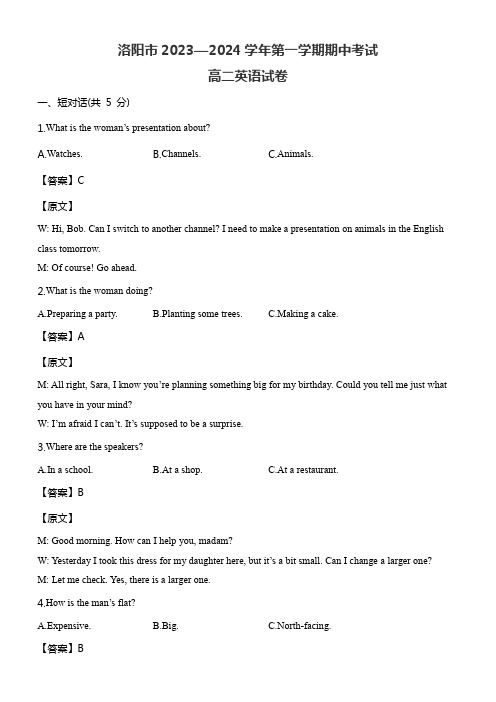
洛阳市2023—2024学年第一学期期中考试高二英语试卷一、短对话(共5 分)1.What is the woman’s presentation about?A.Watches.B.Channels.C.Animals.【答案】C【原文】W: Hi, Bob. Can I switch to another channel? I need to make a presentation on animals in the English class tomorrow.M: Of course! Go ahead.2.What is the woman doing?A.Preparing a party.B.Planting some trees.C.Making a cake.【答案】A【原文】M: All right, Sara, I know you’re planning something big for my birthday. Could you tell me just what you have in your mind?W: I’m afraid I can’t. It’s supposed to be a surprise.3.Where are the speakers?A.In a school.B.At a shop.C.At a restaurant.【答案】B【原文】M: Good morning. How can I help you, madam?W: Yesterday I took this dress for my daughter here, but it’s a bit small. Can I change a larger one? M: Let me check. Yes, there is a larger one.4.How is the man’s flat?A.Expensive.B.Big.C.North-facing.【答案】B【原文】W: Kevin, how is your new flat?M: It’s great, large and south-facing. And the rent is $345 a month with the property management fee and Internet included.W: Wow! That’s a wonderful price.5.What was the man’s major in the past?A.BusinessB.Management.C.Science.【答案】A【原文】W: John, I heard you have changed your major. Is that true?M: Yes. After studying Business for half a year, I found I didn’t really like it.W: So what are you studying now?M: Wild Life Science.二、长对话(共11 分)听下面一段较长对话,回答以下小题。
- 1、下载文档前请自行甄别文档内容的完整性,平台不提供额外的编辑、内容补充、找答案等附加服务。
- 2、"仅部分预览"的文档,不可在线预览部分如存在完整性等问题,可反馈申请退款(可完整预览的文档不适用该条件!)。
- 3、如文档侵犯您的权益,请联系客服反馈,我们会尽快为您处理(人工客服工作时间:9:00-18:30)。
广西南宁二中02-03年上学期高一英语期中考试Ⅰ.单项选择:(共30小题,每小题0.5分,共15分)A)从A、B、C、D中找出其划线部分与所给单词划线部分读音相同的选项。
1. allow A. know B. crowd C. tomorrow D. bowl2. enjoy A. even B. end C. employ D. ever3. biology A. holiday B. soil C. minibus D. price4. fact A. wash B. last C. company D. taxi5. many A. stay B. says C. plays D. takeB)从A、B、C、D四个选项中,选出可以填入空白处的选项。
6.---- By the way, Jane sends her wishes to you.——A. It’s greatB. Thank youC.OKD. it's nice of her7. ---- Your English teacher seems to enjoy football match.——A. So she does.B. So does sheC. So is sheD. So she is.8. Mum doesn't me to mix up such persons.A. have; intoB. allow; with C, hope; of D. get, in9. Is this stranger you are going to introduce to me?A. /B. whoC. whichD. the one10.What you __ when they me off last week ?A. did; do; were seeingB. were; doing; seeingC. did; do; sawD. were; doing; saw11. The chicken on the plate looks __ and smells , too.A. nice; goodB. well; niceC. good; nicelyD. nicely; well12. My father went fishing __A. each two weekB. every two weekC. each two weeksD. every two weeks13. The doctor spent operating the wounded man.A. long all night; withB. all long night; toC. all night long; onD. long night all; at14. I want to knowA. what the word meanB. what does the word meanC. what the word meansD. what did the word mean15. the Chinese have been to Beijing.A. None ofB. AllC. Not allD. Any of16. They tried to find what the cloth was madeA. out; fromB. out; inC. up; ofD. up; at17.Seeds before you keep them.A. must dryB. must be driedC. mustn’t dryD. mustn't be dried18. Any one who __ the rules __A. break; punishB. breaks; are punishedC. break; punishesD. breaks; is punish*ed19.They_ the sports meeting with a wonderful basketball match tomorrow.A. are beginningB. are beginningC. have beganD. have begun20.I've left my ruler in the teachers' office. Who can __ it for me ?A. takeB. bringC. carryD. fetch21 .I think __ our duty __ each other.A. it; to helpB. that; helpingC. this; to be helpedD. that; to help22. __ of new buildings will in our city.A. A great many; buildB. Many, builtC. A large number; be builtD. A lot; be builded23. He looks than we thought.A. much more youngerB. even more youngC. much youngerD. very younger24.We’ll never forget the evenings we spent together.A. thatB. WhenC. whomD. why25. --- What's wrong with Jack ?--- Oh, he __ the bike and __ to the hospital.A. fell down; tookB. fell off; was takenC. fell in; be takenD. fell off; taken26. I’m interested in the people and thinks you to1d me about.A. whichB. whoC. whomD. that27.I have much difficulty studying biology. Whom should I ask for help, your opinion ?A. with; inB. in; withC. with; toD. in; in28. -- Can you help me find __ bed for my new house?-- Of course, but not now. I want to go to bed and have a good sleep.A. a; aB. a;/C. the ;aD. a; the29. There are some differences American English British English;A. both; andB. from; toC. among; andD. between; and30. --- Our vacation was---Yes, I've never hadA. Such great; the better vacationB. greatly; a good vacationC. so great; a good vacationD. very good; the best vacationⅡ. 完形填空(共20小题,每小题1分,共20分)In England nobody 31 the age of 18 is allowed to drink in a public bar. Mr. Tom 32 to a bar near his house 33 often. But he 34 took his son, Jim,_35 he was 36 young. Then 37 Jim had his eighteenth birthday, Mr. Tom 38 him to his usual bar 39 the first time. They 40 for an hour and Mr. Tom said to his son, "Now Jim, I want to 41 you a 42 lesson, You must always be careful not to drink 43 . And 44 do you know when you 45 enough ? Well, I will tell you. Can you see 46 two lights 47 the bar ? When they seem to have 48 four, you have had 49 and you should go home." "But, Dad," said Jim," I can see only 50. light at the end of the bar."31. A. over B. under C. at D. about32. A. went B. go C. goes D. had gone33. A. less B. little C. not D. quite34. A. often B. always C. never D. seldom35. A. because B. although C. since D. when36. A. very B. too C. quite D. rather37. A. before B. while C. when D. as soon as38. A. carried B. fetched C. took D. brought39. A. at B. on C. for D. in40. A. drink B. have drunk C. drank D. had been drunk41. A. teach B. give C. get D. put42. A. useful B. easy C. important D. help43. A. much too B. very too C. very little D. too much44. A. where B. when C. why D. how45. A. had B. would have C. have had D. will have46. A. that B. those C. this D. these47. A. at the end of B. by the end of C. in the end of D. to the end48. A. become B. became C. gone D. lost49. A. little B. few C. enough D. never50. A. one B. two C. three D. fourⅢ. 阅读理解(共20小题,每小题2分,共40分)AAn artist went to a beautiful part of the country for a holiday, and stayed with a farmer. Every day he went out with his paints and his brushes, and painted from morning till evening. Then he came back to the farmer's house and had a good dinner before going to bed.At the end of the holiday, he wanted to pay the farmer, but the farmer Said, "No, I don't want any money, but you'd better give me one of your pictures. What's money ? It will all be spent, but your picture will still be here."The artist was very pleased and thanked the farmer for saying so many kind things about his painting.The farmer smiled and answered, "It is not that. I have a son in London. He wants to become an artist, too. When be comes back next month, I will show him your picture, and then he will not want to be an artist any more, I think."51. Where do you think the story took place ? It took placeA. In LondonB. in the countrysideC. in a foreign countryD. in a city52.What does the "artist" mean in the story ? It means __A. a dancerB. a singerC. a drawerD. an engineer53.What did the artist go to a beautiful part of the country for ? He went there .A. to see the farmer, a friend of hisB. to enjoy his holidayC. to have a rest for workD. to draw some pictures54. Why did the farmer want one of the artist's pictures instead of money ? BecauseA. he would like to show it to his sonB. money was useless to himC. the picture was more valuable than moneyD. he liked the picture very much55.Why did the farmer think that his son wouldn’t want to be an artist when he showedthe picture to his son ? BecauseA. he knew a good picture would lose nothingB. his son would lose interest in painting after seeing such a bad picture ofa famous artistC. he did not like the artist as well as his pictures at allD. his son's painting will not be better than the artist's in the futureBLanguages are always changing. The English of today is quite different fromthe English of 500 years ago. In time, some languages become more important and others become less important. Some even die out completely. About 1000 years ago Englishwas a little known language.If a language has a large number of speakers, or it is very old, there may be differences in the way it is spoken in different areas. That is to say, the languagemay have several dialects. Chinese is a good example of dialect differences. Chinesehas been spoken for thousands of years by many millions of speakers. The differences among the dialects of Chinese are so great that speakers of Chinese from some partsof China can not understand each other.There are other kinds of dialects. In some languages we find words or expressionsand even grammatical forms which are used only by men and others used by women. Whatis more, each generation(一代人) uses its own expressions and grandparents and grandchildren may sometimes have difficulty in understanding each other.56. The English of today is quite different from that of 500 years ago becauseA.people are no longer what they wereB. languages are changing all the timeC.it develops at great speedD. it has many speakers to use it around the world57. Some languages may even die out. Here "die out" means _.A. used once moreB. appear againC. used by some people living far away.D. be out of use58.Why doesn't a grandfather understand his grandson? Because his grandsonA. can speak English tB. is from the other countryC. uses children's own expressionsD. lives in another place59.People of the same country may find it difficult to understand each other becauseA. some people are not open to the outside world enoughB. they do not like to speak to each otherC. they have different opinions and don't like each otherD. they speak in different ways60. A language may have many dialects. "Dialects "meansA. languages which are different in words, grammar ,etc.B. the same languages with different pronunciationC. the same languages without grammar rulesD. none of the all aboveCOne day a policeman was taking a thief to the city police station. On theirway they came to a shop where bread was sold."We have no food, and we must eat something on the train," said the thief. "It’s a long way to the city and we will spend much time getting there. I'll go into this shop and buy some bread. Then you and I can eat it on the train. Wait here for me." The policeman was glad, "I'll have some food on the train, "he thought. "Be quick," he said to the thief. "We haven't much time."The thief went into the shop, and the policeman waited in the street for a long time. He began to worry. He thought about the train, and at last he went into the shop."Where is the man who came in here to buy some bread ?" asked the policeman. "Oh, he went out by the back door. "said the shop keeper.The policeman ran out but he could not see the thief. So he had to go back to his own station and tell others about it. They were very angry with him, and he was very unhappy.All the police of the town began to look for the thief again, and they soon caught him. They brought him back to the police station and called the same policeman. "Now," said the officer, "take him to the city, and don't lose him again." The policeman and the thief left the station, and they came to the same shop. "Wait here," said the thief. "I want to go into that shop and buy some bread." "Oh, no," said the policeman. "You did that once, and you must wait here for me."61 .The policeman was asked toA. look for the thiefB. buy some breadC. bring the thief to the shopD. take the thief to the city62. __, the policeman and the thief found a shop where bread was sold.A. when they arrived at the cityB. On their way to the railway stationC. During their stay at a small townD. When they got to the station63.The thief entered the shop toA. buy some breadB. have a restC. run awayD. steal some money64. When the thief went into the shop, the policemanA. waited for him in the streetB. followed him into the shopC. went on walking to the stationD. returned to the police station65. Which of the following statements is Not true ?A. The thief was caught againB. The same policeman was asked to take the thief to the cityC. The thief again entered the shop in order to run away.D. The policeman lost the thief for the second time.DYesterday morning Paul said to himself," I've got to write that history paper today. If I don't do anything else I've got to write that paper."He sat down at his desk and put a piece of paper into his typewriter. He looked out of the window, ate a sweet got up to get a drink of water, brushed his teeth, and sat down at his desk again."I haven't written to my family for weeks." He said to himself." I'll write thema letter first."Paul wrote his family a long letter. And then he said to himself, "My typewriter needs a new ribbon(色带). I've got to change this ribbon, before I write my history paper."The ink from the typewriter ribbon made his hands very dirty, so he washed them. While he was washing his hands, he noticed that his fingernails were too long. He cut them very carefully and then back to his desk. He put a piece of paper into his typewriter, looked out of the window, and looked at his watch. It was almost noon. "I'11 get some lunch now." he said to himself." After lunch I'll write that paper, if I don't do anything else."66.In the passage a history paper is __A. a test on historyB. an article about historyC. a newspaper about historyD. a piece of paper about history67.Paul wrote a long letter to his family with __A. a penB. pencilC. his typewriterD. I don't know68.Paul would change __ before he wrote his history paper.A. his penB. the ribbonC. the typewriterD. his pencil69.After changing the ribbon, Paul __A. wrote the history paperB. washed his handsC. had lunchD. cut his fingernails70.That morning Paul __A. did what he wanted to doB. wrote the history paperC. didn't write the history paperD. was too busy to write the history paper Ⅳ. 短文改错(共10小题,每题1分,共10分)In the 18th century, a English young man 71.Sanwich like to play cards for money. He often played 72.for 24 hours, and didn't even stop have his meals. 73.He ordered his men to take some meat and bread, 74.He played while eating. He liked to put a meat 75.in two pieces of bread and he held the food in his left 76.hand while he played with his left hand. People liked 77.Sanwich idea and began to eat bread and meat in the 78.way, Later this bread called Sanwich. Form the name of the man 79. Sanwich, we have the word" Sandwich" today 80.Ⅴ. 书面表达(共1题,共15分)假如今年暑假你去唐山市游玩,请你介绍唐山市。
